 www.U-35.com
www.U-35.comThe Homepage for U-35, a Type VII U-Boat
... 1936 - 1939 ...
|
|
|
|
|
|
|
  Werner Lott [14]
Werner Lott [14]
|
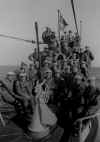 The crew of
U-35, including
Werner Lott, in September 1937 in Kiel. [90] The crew of
U-35, including
Werner Lott, in September 1937 in Kiel. [90] |
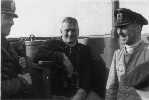 Wilhelm Zahn, Werner Lott, and Friedrich-Hermann Vollmer in
late 1937 or 1938. [72]
Wilhelm Zahn, Werner Lott, and Friedrich-Hermann Vollmer in
late 1937 or 1938. [72]
|
 Werner Lott [35]
Werner Lott [35]
|
 Werner Lott, on board U-35.
Werner Lott, on board U-35.
|
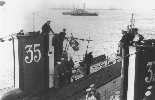 Kptlt. Werner Lott on U-35, and Kptlt. Paul Büchel on U-32. [60]
Kptlt. Werner Lott on U-35, and Kptlt. Paul Büchel on U-32. [60]
|
 Hans-Bernhard Michalowski, Hans-Joachim Roters, and Werner Lott, on board
U-35.
Hans-Bernhard Michalowski, Hans-Joachim Roters, and Werner Lott, on board
U-35.
|
| Around August 20,1939 we had held exercises with all our U-boats in the deeper waters of the Central Baltic Sea for a manoeuvre that Hitler had ordered to show off to the king of Italy on his state visit August 24-28, 1939, if I remember the dates correctly. Hitler had been impressed on his state visit to Italy May 1939 by a rather static display of submerged power in Naples Bay and now Hitler wanted to impress him with daring and very mobile manoeuvres. All went well on this exercise around Hitler's aviso Grille and thereafter we all entered Swinemünde Harbour. There the U-boat captains were invited to lunch with him onboard Grille where CinC Raeder presided and Doenitz was also present. After lunch a most unusual thing happened: Raeder rose, made a few complimentary remarks and then said "Have you any questions?" I knew him personally well and shot without a second's hesitation the question at him: "We cannot help feeling that we are drifting towards war - is that really unavoidable?" And he also answered without hesitation: "Hitler has so far achieved so much in his six years in power that I do not think he will risk all the positive achievements in a hazardous war." [39] |
 On board U-35, Werner Lott (right) with Albert Thomason, master of
ALVIS, during the first war patrol. [32]
On board U-35, Werner Lott (right) with Albert Thomason, master of
ALVIS, during the first war patrol. [32]
|
 Werner Lott being addressed by Admiral Karl Dönitz
and staff, upon return from the first war patrol. U-35 in background. [32]
Werner Lott being addressed by Admiral Karl Dönitz
and staff, upon return from the first war patrol. U-35 in background. [32]
|
 Heinz Erchen, Karl Schnute,
and Werner Lott (right) inspecting crosses awarded by the Kriegsmarine.
[32,33]
Heinz Erchen, Karl Schnute,
and Werner Lott (right) inspecting crosses awarded by the Kriegsmarine.
[32,33]
|
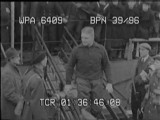  Werner Lott departing HMS Kingston in Glasgow, Scotland.
Werner Lott departing HMS Kingston in Glasgow, Scotland. |
|
Our experiences with HMS Kingston and Kashmir were extraordinarily good after our boat had gone down. I was picked up as the last but one and as my life saver had been damaged when the U-boat sank under my feet I was already completely exhausted and stiff from the cold water. Somerville made a perfect manoeuvre and they threw me a rope which I could not hold in my stiff fingers. To my amazement they lowered a boat, hauled me into it and threw me like a bag onto the destroyer's deck because I had become too weak to jump on my own in the heavy sea. Under a doctor's supervision I was put into a hot bath and a bottle of Scotch held to my mouth which altogether gave all of us an astonishingly quick recovery. On board we were told that we would be decently treated provided we gave no reason for trouble. We all got comfortable quarters yet were carefully guarded which went without difficulty. In Greenock we were handed over to a Scottish battalion guarding us under the command of a Major. In the night train to London Dec 2/3 39 all in our carriage were alarmed around midnight when Stamer had somehow organised a bottle of beer for everybody for then my birthday began. The Scottish guards taught us "happy birthday" - a most extraordinary story in the early war. It so happened that I was escorted into the Tower of London on my 32nd birthday, the 3rd of December 1939. Heavily guarded by the Scotch Guards I was put into a prison cell down in the basement with a rusty bedstead as its only furniture. It was a cold winter and there was a fireplace, but with no fire in it. And a piece of paper pinned to the wall contained the regulations of the Geneva Convention in broken German: Please your holding power and do what they say! I asked to see an officer with the only result that a sergeant would appear with the monotonous answer: I'll see what I can do for you. Thereupon I decided to go on hunger strike until I came to see an officer - with very little effect, I must say. But I was lucky. As I was slowly beginning to doubt the wisdom of my decision, there was suddenly a commotion in front of my cell and when the door opened no lesser a person appeared than Lord Louis Mountbatten - flotilla chief of the destroyers that sunk our submarine. I shall never forget the expression on your face and the four words to the sergeant: Where is the commandant? It did not take long until a rather red-faced major from the Scotch Guards appeared and explained that it was all a horrible misunderstanding and that I would soon be moved into comfortable quarters. As recollected by Werner Lott and Lord Mountbatten, Lott: I should like to thank you for the way that we were treated onboard the KINGSTON and KASHMIR after the whole of my ship's company was captured by them. We could not have been more correctly treated and Lieutenant Commander Somerville even let me have the cabin of an officer on leave. Finding be was unmarried I obtained the name and address of his mother so that I could see she was properly looked after. Mountbatten: She is a free woman living in a free country. You are a prisoner-of-war in our hands. I don’t see what you can do to help her? Lott: Not now but next Summer when we invade England and take over. Then I would like to make sure that she is well treated by the occupying forces. Mountbatten: I am afraid you don’t understand what is going to happen in this war; yet you should as you are a naval officer. In the 1914/18 war your army was victorious everywhere but the Royal Navy blockaded you to the point of starvation, surrender and revolution. In this war your army will unquestionably be victorious in Europe when they come to over- run France next year but you still have got to cross the sea to invade England. The Royal Navy and the Royal Air Force will prevent that. You will find the Germans confined to a conquered continent without having conquered the United Kingdom. Then in due course Hitler will make the same mistake that the Kaiser made which will involve the United States of America coming into the war on our side. When that happens it will be we who will invade the continent and defeat Hitler on land. That will be the end of the war with victory for us and defeat for you. I think therefore you had better start learning English and preparing yourself for the difficult times you will find in Germany after your release. I was also allowed to see my officers who had made the same experience and I kept thinking of Lt. Commander Sommerville's advice when I left his ship: treatment by the army will be different, but do not take it as bad will - it is lack of experience. A very sound advice that I have followed throughout the long years of prisonership, very likely to everybody's benefit. And when we were invited by the Admiralty to our parole dinner where Commander Halahan acted as host I could not help thinking: Why are we fighting each other? [39] |
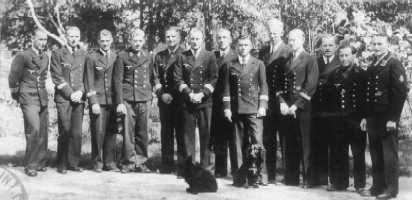 In the Gravenhurst POW camp, from left: Gerhard Stamer (U-35), Heinz Erchen (U-35),
Hermann Beckmann (U-27), Albert Schrader (U-35), Werner Lott (U-35), Johannes Franz (U-27), Schilling
(L.I. U-33),
Hans Jenisch (U-32), Hans-Joachim Roters (U-35),
Johannes Becker (U-33),
Anton Thimm (LI, U-32),
Fritz Erbshäuser (U-32), [unknown]. [76] The dog on the left was
named "Hexe" (witch) and belonged to Hans-Joachim Roters;
the dog on the right was named "Flaps" and belonged to Becker.
[33]
In the Gravenhurst POW camp, from left: Gerhard Stamer (U-35), Heinz Erchen (U-35),
Hermann Beckmann (U-27), Albert Schrader (U-35), Werner Lott (U-35), Johannes Franz (U-27), Schilling
(L.I. U-33),
Hans Jenisch (U-32), Hans-Joachim Roters (U-35),
Johannes Becker (U-33),
Anton Thimm (LI, U-32),
Fritz Erbshäuser (U-32), [unknown]. [76] The dog on the left was
named "Hexe" (witch) and belonged to Hans-Joachim Roters;
the dog on the right was named "Flaps" and belonged to Becker.
[33]
|
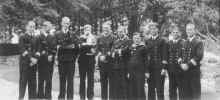 U-35 and U-42 crewmembers assembled at a POW camp.
U-35 and U-42 crewmembers assembled at a POW camp.Left to right: Gerhard Stamer (U-35), Heinz Erchen (U-35), Hans-Joachim Roters (U-35), Albert Schrader (U-35), Werner Lott (U-35), Rolf Dau (U-42), Siegfried Ludwig (U-42), Julius von Gosen (U-42), Otto Meye (U-42), Max Dünnebier (U-42). [53] |
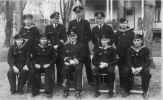 U-35 crewmembers assembled at the Grande-Ligne POW camp in Quebec, Canada, 1944.
U-35 crewmembers assembled at the Grande-Ligne POW camp in Quebec, Canada, 1944.Back row, left to right: Gerhard Freier, Heinz Erchen, Hans-Joachim Roters, Gerhard Stamer, Paul Fichte Front row (seated), left to right: Albert Schrader, Siegfried Kienast, Werner Lott, Peter Schwarz, Kurt Grosser [33] |
|
When I as the leader of the German Mobile Exhibition Central and
East Africa met the prosperous farmer Halahan and his family on the slopes of Mount Elgon in Kenya 25 years later we had a memorable celebration - and we asked each other the same question - "Why were we fighting each other?" On this same trip through East Africa I had to give many addresses to Rotary Clubs still very much alive in those days. And almost invariably I was toasted by the local President as a "guest of honour we all envy for one privilege he has enjoyed: he was H.M.S. guest in the Tower of London". When I participated in a conference of the European Training Institute in Paris which was held in London several years ago I entertained my wife to dinner in Scotts Restaurant and also visited the Tower of London under a Beefeater’s guide. When the tour was over and question time opened I asked our guide whether one of the beefeaters had ever shown around somebody who had actually sat in the Tower as a prisoner. "Oh no", he said, "these times are long past." And he was quite astounded when I told him afterwards about my stay in the Tower. [39] |
 Werner Lott (ca. 1965) [1]
Werner Lott (ca. 1965) [1]Werner Lott involved himself deeply in the German YMCA, co-founding the organization "BFW Vallendar" (http://bfw-vallendar.de; see specifically http://bfw-vallendar.de/new/uberuns/geschi.htm). |
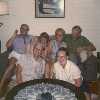 
|
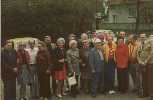  Werner Lott at a reunion of the U-35 crew.
Werner Lott at a reunion of the U-35 crew.
|
|
Korvetten Kapitän a. D. Werner Lott, Your chief Engineer, my old friend, Gerhard Stamer, has written to inform me that you will be celebrating your 70th birthday on the 3rd December. I am, therefore, writing this letter now with the request that he will deliver it to you on your birthday with my personal best wishes and congratulations. Gerhard Stamer tells me that it was while you were taken from Glasgow to London in December 1939 that you celebrated your birthday in the train and that the guards provided a bottle of beer at midnight with which to drink your health. I should like to take the belated opportunity of congratulating you on your magnanimous behaviour when you landed the crew of the Greek ship, DIAMANTIS, in a remote bay In Ireland about the 4th October 1939, at considerable risk. Those were the days when the two navies behaved particularly well to each other and to others at sea during the war. |
In response, Werner Lott wrote to Lord Mountbatten on 19 Dec 1977:
|
Sir, When Gerhard Stamer delivered your personal letter to me on my 70th birthday I was equally surprised and pleased. Thank you very much for this honour. The newspaper clippings of the DIAMANTIS case give only the Greek captain’s version of the story. Ours was considerably different. But on my birthday we talked a good deal about the miracle that we were all saved through the rescue efforts of HMS KINGSTON and KASHMIR. I am not sure whether you know that Commander Somerville had to lower a cutter to pick me up as the last but one because my fingers were too stiff to hold the rope thrown to me from the destroyer. As you said in your letter: "Those were the days ...." With my personal best wishes for yourself I am, Sir, respectfully yours Werner Lott |
 The 1980 reunion in Emden, Germany.
The 1980 reunion in Emden, Germany.L-R: Albert Schrader, Hans-Joachim "Jonny" Roters, Friedrich-Hermann Vollmer, Willi Jacob, Paul Liebau, Heinz Pfeifer, Martin Müller, Gustav Horstkötter, Wilhelm Janssen, Werner Lott, Karl Sommerer, Erich Bartold May, Peter von der Helm, Gerhard Stamer. [55] |
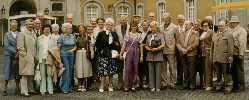 Photo: Augustusburg palace in Brühl. L-R: Inge Lott,
Walter Konradt, Friedrich-Hermann Vollmer,
Hans-Joachim "Jonny" Roters, Martha Konradt, unknown, Lucia May,
Werner Lott,
Charlotte Vollmer, Grete Balke, Wilhelm Silbernagel (guest), Mrs. Silbernagel,
Änne Horstkötter
Gustav Horstkötter,
unknown (girlfriend of Hans-Joachim "Jonny" Roters),
Albert Göbel (U-39), unknown,
Erich Bartold May,
Inge Pfeifer,
Heinz Pfeifer,
Peter von der Helm,
Martin Müller,
Mrs. Schwarz, Maria Weigand, unknown,
Willi Jacob,
unknown,
Johannes Weigand. [54]
Photo: Augustusburg palace in Brühl. L-R: Inge Lott,
Walter Konradt, Friedrich-Hermann Vollmer,
Hans-Joachim "Jonny" Roters, Martha Konradt, unknown, Lucia May,
Werner Lott,
Charlotte Vollmer, Grete Balke, Wilhelm Silbernagel (guest), Mrs. Silbernagel,
Änne Horstkötter
Gustav Horstkötter,
unknown (girlfriend of Hans-Joachim "Jonny" Roters),
Albert Göbel (U-39), unknown,
Erich Bartold May,
Inge Pfeifer,
Heinz Pfeifer,
Peter von der Helm,
Martin Müller,
Mrs. Schwarz, Maria Weigand, unknown,
Willi Jacob,
unknown,
Johannes Weigand. [54]
|
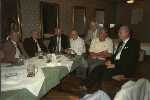 A reunion of the U-35 crew in May 1984 in Hamburg
L-R: Martin Müller, Johannes Weigand,
Siegfried Bruse, Willi Jacob, Peter von der Helm, Walter Roloff, Werner Lott. [54,63]
A reunion of the U-35 crew in May 1984 in Hamburg
L-R: Martin Müller, Johannes Weigand,
Siegfried Bruse, Willi Jacob, Peter von der Helm, Walter Roloff, Werner Lott. [54,63]
|
 Sean Cleary with Werner Lott in 1984 at Cleary's farmhouse in Ballymore,
Ventry, Ireland, where the Greek crew found refuge after the DIAMANTIS
was sunk. [34]
Sean Cleary with Werner Lott in 1984 at Cleary's farmhouse in Ballymore,
Ventry, Ireland, where the Greek crew found refuge after the DIAMANTIS
was sunk. [34]
|
 Jimmy Fenton with Werner Lott in 1984, at the point where U-35 landed the 28 Greek sailors at Ventry harbor, Ireland in October 1939. As a young boy, Jimmy Fenton witnessed the event. [34,41]
Jimmy Fenton with Werner Lott in 1984, at the point where U-35 landed the 28 Greek sailors at Ventry harbor, Ireland in October 1939. As a young boy, Jimmy Fenton witnessed the event. [34,41]
|
 [35,14] Werner Lott returns to the Tower of London. This photo,
taken in September 1984 by Yeoman Warder Brian Harrison, was posed in
front of the metal railing to the west of the White Tower. The open area
behind Mr. Lott was the site of his former prison, the Main Guard, which
was destroyed by German bombs in December 1941. The 1984 visit was recorded by Brian
Harrison in an article in The Legion in early 1985 (click to view).
[35,14] Werner Lott returns to the Tower of London. This photo,
taken in September 1984 by Yeoman Warder Brian Harrison, was posed in
front of the metal railing to the west of the White Tower. The open area
behind Mr. Lott was the site of his former prison, the Main Guard, which
was destroyed by German bombs in December 1941. The 1984 visit was recorded by Brian
Harrison in an article in The Legion in early 1985 (click to view).
|
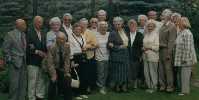 U-35 reunion in 1994.
U-35 reunion in 1994.Men, l-r: Georg Ludwig Hengen, Hubert Hirsch, Friedrich-Hermann Vollmer, Gustav Horstkötter, Helmut Parthum, Werner Lott, Walter Roloff, Heinz Pfeifer. [60] |
|
C 26 - Am 2. Mai 1997 verstarb unser Crewkamerad, Korvettenkapitän aD Werner Lott, im Alter von 89 Jahren. Lott ging als einer der ersten der Crew schon 1936 zur U-Bootwaffe. Bei Kriegsbeginn war er Kommandant von U-35. Im November 1939 wurde er auf seiner zweiten Feindfahrt in der nördlichen Nordsee von drei englischen Zerstörern gestellt und sein Boot versenkt. Den Krieg erlebte er als Kriegsgefangener in Kanada. Auf Grund seiner Persönlichkeit war er im Gefangenenlager hoch geachtet und hat ausgleichend auf seine Kameraden eingewirkt. Nach dem Kriege galt seine ganze Arbeitskraft dem Jugendsozialwerk im Christlichen Verein junger Männer. Diese Tätigkeit war mit vielen Ortswechseln verbunden, da er als führende und prägende Persönlichkeit überall beim Neuaufbau eingesetzt wurde. In den sechziger Jahren führte er eine mobile Ausstellung für den Entwicklungsdienst durch Ostafrika und durch Nord-, Mittel- und Südamerika. Erst in den siebziger Jahren fand er eine ruhige Position als Leiter eines Umschulungszentrums im Rheinland. Lott war der geborene Menschenführer. Wo er auftrat war er ein Vorbild für Jüngere, so daß er nach dem Kriege mit besonderem Erfolg im Jugenddienst tätig war. Mit seiner ganzen Kraft hat er sich für diese schwierige Aufgabe eingesetzt. Wir haben ihn als einen hilfsbereiten und ratgebenden Kameraden erlebt und geschätzt. Er lebte wohlversorgt in einem Seniorenheim und starb wenige Tage nach dem Tod seiner zweiten Frau. |
|
Herr Lott wirkte Jahrzehnte bis zu seinem Ruhestand in leitenden Positionen des Christlichen Jugenddorfwerkes Deutschlands e. V., er gestaltete Zukunft für Jugendliche und Erwachsene. Lange Jahre leitete er das Berufsförderungswerk Maximiliansau und war im Auftrag des Christlichen Jugenddorfwerkes Mitbegründer des Berufsförderungswerkes Vallendar. Wir nehmen Abschied von einem Vorbild, von einem Vordenker und einem Menschen, der sich in seinem ganzen Leben für andere Menschen eingesetzt hat, einem Freund der beruflichen Rehabilitation Behinderter. Wir werden ihm ein ehrendes Andenken bewahren. Berufsförderungswerk Vallendar gemeinnützige GmbH Dieter Oppermann Sprecher der Geschäftsleitung des Christlichen Jugenddorfwerkes Deutschlands e. V. Bernd Böckle Direktor Direktor Werner Lott war, nachdem er im Weltbund des YMCA Weltbundsekretär und anschließend Generalsekretär des CVJM in Bremen war, seit 1955 an leitender Position im Christlichen Jugenddorfwerk Deutschands tätig. Er begann seine berufliche Laufbahn im CJD auf dem Obersalzberg, in der Jugenddorf-Christophorusschule, wo er seine erste Frau verlor. 1957 ging er in das Jugeaddorf Iffezheim und wechselte 1959 in das Bergbau-Jugenddorf Zehnthof Essen. Er war in dieser Zeit Berater und Sonderbeauftragter für Jugendsozialarbeit des Christlichen Jugenddorfwerkes Deutschlands und leitete 1963 die Wanderausstellung der Bundesrepublik Deutschland in Zentral- und Ostafrika. In dieser Zeit vertrat seine Frau Ingeborg ihn im Jugenddorf Zehnthof. 1964 wechselte Werner Lott in das Jugenddorf Castrop-Rauxel. Als am 1. Januar 1966 die Jugenddörfer Schott in Mainz und das Berufsförderungswerk Maximiliansau einen neuen Leiter suchten, übernahm Herr Lott diese Aufgabe gerne. Das Jugenddorf Schott in Mainz wurde 1967 einer neuer Jugenddorfleitung unterstellt und Herr Lott konnte sich ganz den Aufgaben des Berufsförderungswerkes Maximiliansau widmen. Von Anfang an wurde sein Engagement für den behinderten Menschen hier besonders benötigt. So war es naheliegend, dass er das Jugenddorf Maximiliansau ausbauen und zeitgemäß einrichten wollte. Durch die Netzplanung der Bundesregierung war der Standort Maximiliansau als Berufsförderungswerk nicht mehr haltbar. Herrn Lott wurde angeboten, hier in Vallendar ein neues Berufsförderungswerk zu konzipieren und mitzugründen. Bis zu seinem wohlverdienten Ruhestand am 31. Dezember 1973 war er Direktor der neugegründeten Berufsförderungswerk Vallendar gGmbH. Aber selbst im Ruhestand hat Herr Lott aktiv am Leben des CJD teilgenommen. Auch auf seine Initiative hin wurde die Seniorenschaft des Christlichen Jugenddorfwerkes Deutschlands gegründet, die heute zu einer großen Seniorenvereinigungen in der Bundesrepublik zählt. Im November 1979, bereits 72jährig, übernahm er kurzfristig die Jugenddorfleitung in unserer Jugenddorf-Christophorusschule Elze. Zunächst war dies nur für wenige Monate gedacht, daraus wurde aber ein ganzes Jahr. Er hat, dem Christlichen Jugenddorfwerk Deutschlands, seinen Mitarbeitern und den jungen Menschen in vorbildhafter Weise gedient. Er war ein Mann, der vordenken konnte und die Weichen für die von ihm geleiteten Einrichtungen immer gestellt hat. |
|
|
|
|
|
|
|
 (relative of
U-35 Chief Engineer Gerhard Stamer)
(relative of
U-35 Chief Engineer Gerhard Stamer)